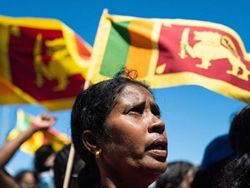Haridass Sankar* says while Chinese debt has been largely blamed for Sri Lanka’s economic crisis, the real reason lies in its troubled history.
 Sri Lanka is undergoing a severe economic crisis and is at the risk of collapsing into a failed State.
Sri Lanka is undergoing a severe economic crisis and is at the risk of collapsing into a failed State.
The country’s foreign reserves are fast depleting, falling from about $A7 billion in 2019 to $A2.5 billion in 2021.
Inflation is high and the debt-to-Gross Domestic Product (GDP) ratio is 110 per cent.
The debt trap diplomacy of China and COVID-19 are largely blamed as the sources of the crisis, with the debt trap laying the fuel and COVID the spark that ignited the fire.
However, I believe the root cause of the economic crisis and all the other problems the nation has been dealing with for decades is the country’s identity crisis and sense of insecurity.
This has resulted from the two dominant factions in the country: the Sinhala Buddhists and the Tamil nationalists.
Differences, ethnic and non-ethnic, separate the groups, who are also split along religious and linguistic lines.
The majority of Sinhala people feel unhappy sharing their territory with Tamils, while the Tamil minority feel insecure alongside the majority Sinhala.
This sense of vulnerability ultimately resulted in the civil war that lasted for decades and ravaged the nation.
The same uneasiness led to the majority being convinced to provide legitimacy and power to an aristocratic governmental structure to preserve its interests.
This autocratic political system is reflected via the Sri Lanka People’s Front, or Podujana Peramuna, and the New Democratic Front, both endorsed by the Sinhala majority in the country’s political institutions.
As a result, the nation’s political structure was transformed from democracy to aristocracy.
Sri Lanka was classified as a “flawed democracy” by the Economist Intelligence Unit in 2019. It revealed a nation plagued by corruption, widespread exploitation and repression of minorities, among other things.
Sri Lanka’s troubled political structure and its geographic location on the Indian Ocean exposed it to foreign threats.
China has poured large quantities of money into Sri Lanka to aid the country’s growth and development. However, the corruption-plagued political system of Sri Lanka was unable to translate the flood of riches into productive assets.
Then came COVID-19. Sri Lanka is heavily reliant on its tourist sector, which accounted for 10 per cent of its GDP.
The pandemic wiped out that industry. To add fuel to this fire, the Government made efforts to promote organic farming by prohibiting the use of chemical fertilisers.
This measure, implemented during a period of economic and social distress, had a detrimental effect on domestic food production and limited the export of cash crops, mainly tea.
Organic farming practices lowered tea and other cash crop yields, limiting export capacity and revenue.
The decline in food output necessitated the importation of food crops, putting further strain on the country’s currency reserves, which were already reduced due to interest payments on loans
Finally, massive tax cuts, resulting from an election commitment, and a failed effort to revive the economy brought the nation’s economy to a standstill.
Sri Lanka’s debt must be restructured quickly and a debt management program implemented using the International Monetary Fund’s (IMF’s) financial and technical assistance and by austerity measures.
Sri Lanka has evaded using IMF resources in the past, but if the nation is to survive this intervention is necessary, and it is the best course of action.
*Haridass Sankar is a geopolitical analyst and part-time PhD scholar researching international political economy. His area of expertise is the Asia-Pacific Region in the 21st century.
This article first appeared on the Eurasia Review website.



